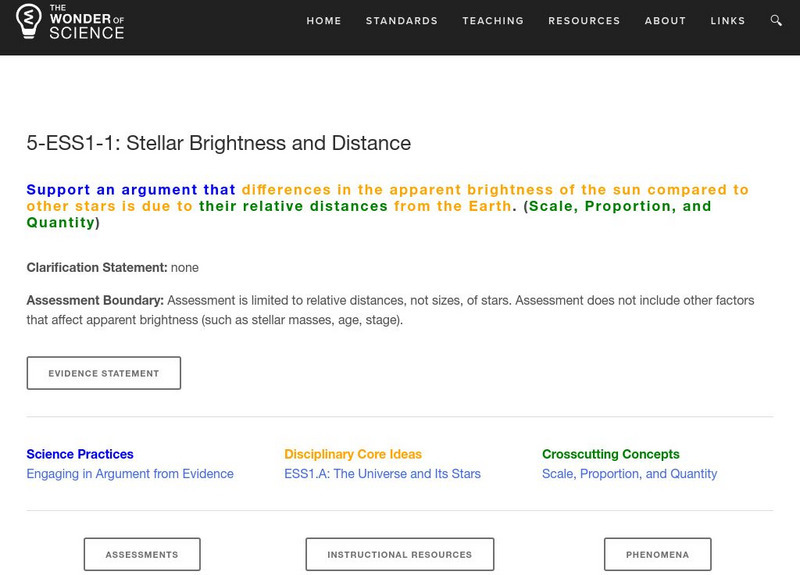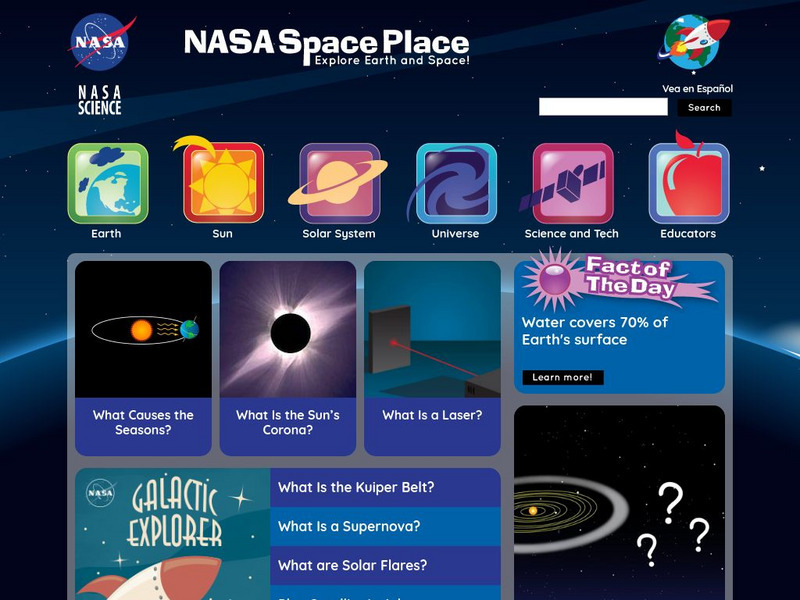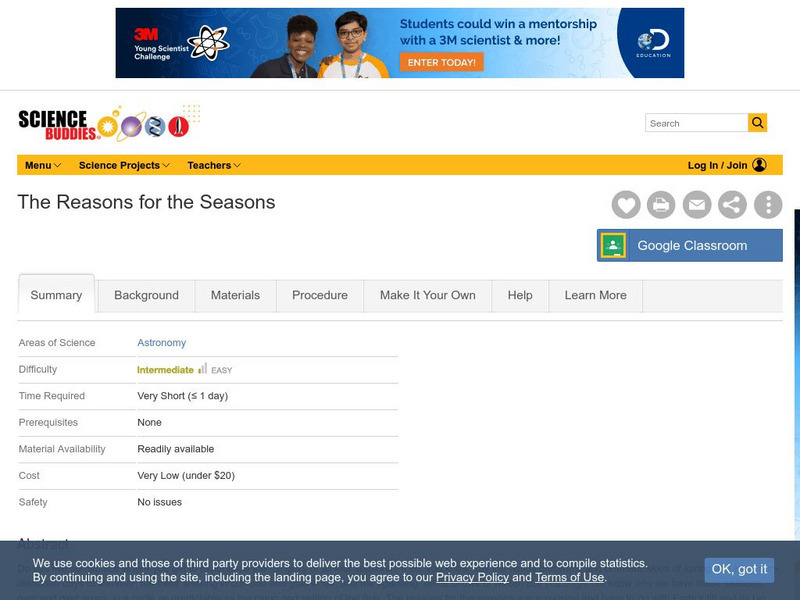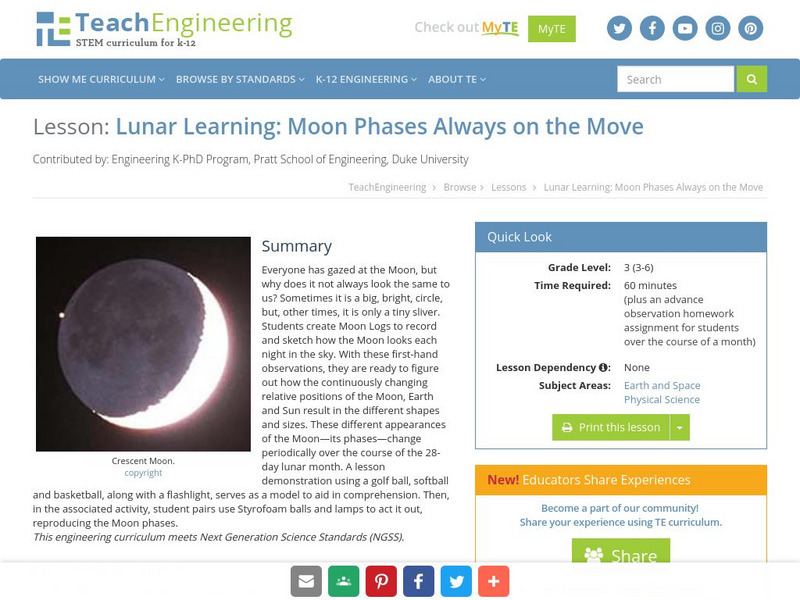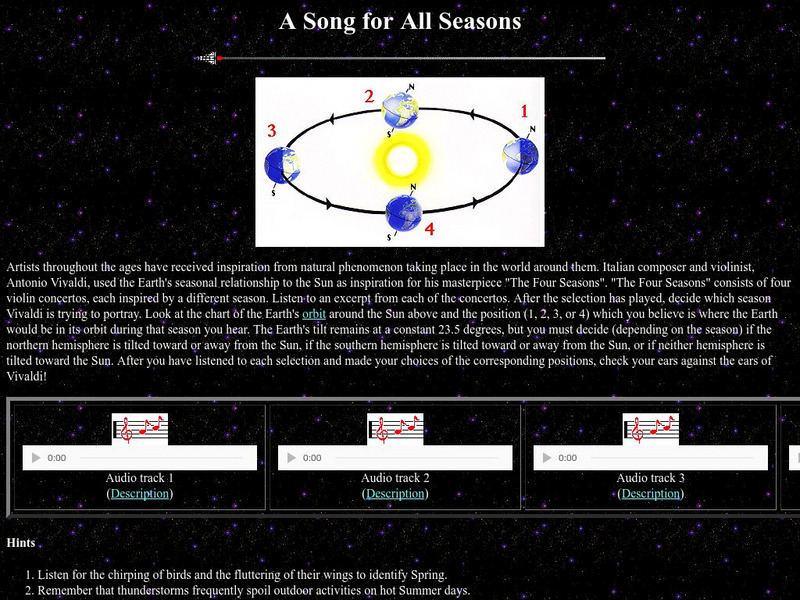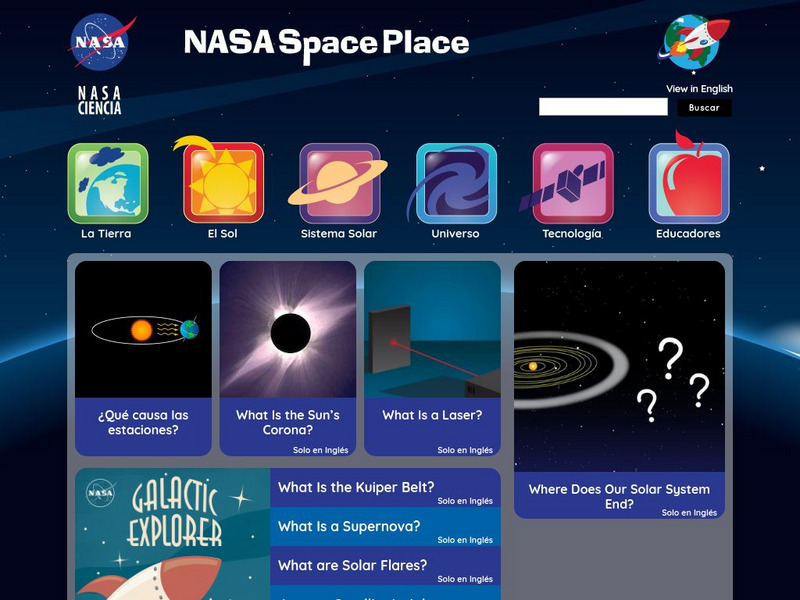Hi, what do you want to do?
The Wonder of Science
The Wonder of Science: 5 Ess1 1: Stellar Brightness and Distance
Students will learn about stellar brightness and distance to be able to support their argument about the apparent brightness of our sun compared to other stars due to their distances with these lesson plans.
PBS
Pbs News Hour Extra: Lesson Plan: Planets in Proportion
Students learn about the distance and relative size of the rest of the planets compared to the Earth and Sun. The lesson plan includes an assessment and extension activities.
TeachEngineering
Teach Engineering: Lunar Lollipops
The students work in teams of two to discover the relative positions of the Earth, Sun and Moon that produce the different phases of the Moon. The students will be given a Styrofoam ball that they will attach to a pencil so that it looks...
ClassFlow
Class Flow: Earth, Sun and Moon
[Free Registration/Login Required] In this unit children learn about the shapes and relative sizes of the Earth, Sun and Moon. Using models they learn how the three bodies move relative to each other and how these movements relate to...
BioEd Online
Bio Ed Online: Reason for the Seasons
In this set of activities, the path the Sun takes in relation to the Earth is tracked by students on two days, with three months in between them. They will develop an understanding of what causes the seasons as they examine the effects...
NASA
Nasa: The Space Place
This site from NASA's Space Place is geared towards early elementary learners. It offers detailed instructions for crafts and activities related to space, games and a teacher resource area. Students can also ask an expert at this site.
Exploratorium
Exploratorium:seasons/shadows: Investigate How Shadows Shift Throughout the Year
Ancient Chacoans used shadows to tell daily time and seasons. Build a model that demonstrates the changes in Earth's tilt that affect the length of shadows relative to the sun that determines the seasons. The lesson plan uses everyday...
PBS
Pbs Learning Media: All Planet Sizes
This illustration from the Lunar and Planetary Laboratory shows the approximate sizes of the planets relative to each other. Note that the planets are not shown at appropriate distances from the Sun.
Science Buddies
Science Buddies: Project Ideas: The Reasons for the Seasons
In this astronomy science fair project, investigate how the earth's axial tilt creates seasons. The Science Buddies project ideas are set up consistently beginning with an abstract, objective, and introduction, followed by a section on...
NASA
Nasa: Solar System Exploration
Enter our solar system to interact with the planets, moons, asteroids, meteors, and more. Investigate with NASA scientists and explore missions related to space exploration. Read facts, compare statistics, look through resources, and...
TeachEngineering
Teach Engineering: Lunar Learning
Why does the Moon not always look the same to us? Sometimes it is a big, bright, circle, but, other times, it is only a tiny sliver, if we can see it at all. The different shapes and sizes of the slivers of the Moon are referred to as...
CK-12 Foundation
Ck 12: Physics Simulation: Phases of the Moon
[Free Registration/Login Required] Learn how the steady motion of the Moon around the Earth, and the phases created by the relative position of the Earth, Sun, and Moon, allow us to tell time by simply looking at the shape and...
Utah Education Network
Uen: Patterned Paragraphs
Students will learn about the importance of including specific details when writing. Students will watch the teacher model "How to Make a Peanut Butter Sandwich." Then student will replicate the process for writing with specificity as...
Merriam-Webster
Merriam Webster: Dictionary Illustration: Solar Eclipse
Basic diagram of a solar eclipse illustrates the relative positions of the sun, moon, and earth.
NASA
Nasa Star Child: A Song for All Seasons
After listening to excerpts from four of the violin concertos from "The Four Seasons" by Italian composer and violinist, Antonio Vivaldi, decide which excerpt was meant to go with which season, and also decide where the earth would be in...
Lerner Publishing Group
Lerner Classroom: Teaching Science Through Literacy
In this lesson plan, students will gather evidence to support the argument that differences in the apparent brightness of the sun compared with other stars is due to their relative distances from Earth. Students will also write texts in...
PBS
Pbs: Why Do We Have Seasons?
A student-directed tutorial showing all aspects of seasons, including Earth's tilt position in relation to the sun, photos of typical weather during that season, and some informational text to support the visuals.
NASA
Nasa: Space Place
In this site you can explore, do and play games related to space, solar system, our planet and people and technology.
National Earth Science Teachers Association
Windows to the Universe: What Controls the Climate?
Learn what aspects of our planet have an impact on climate. Links to related materials.
Curated OER
Harvard University: The Solar System
These hands-on activities are are a great way for students to gain perspective on the relative sizes and distances of each planet, the relationship between the sun and Earth, and much more.
University of Wisconsin
University of Wisconsin: Reasons for the Seasons
A brief explanation of the Earth's rotation around the Sun and how it relates to the amount of sunlight the Earth receives, and to the seasons. Includes two questions for students to respond to.
Curated OER
Harvard University: The Earths Orbit
Students perform many inquiry activities related to Earth's orbit. Included are recording daily temperatures, observing the sun's path over several weeks, tracking sunrise and sunset times, and angle of sunlight. Diagrams make lessons...
Curated OER
Harvard University: The Earths Orbit
Students perform many inquiry activities related to Earth's orbit. Included are recording daily temperatures, observing the sun's path over several weeks, tracking sunrise and sunset times, and angle of sunlight. Diagrams make lessons...
Curated OER
Bill Arnett's Ss Montage
These hands-on activities are are a great way for students to gain perspective on the relative sizes and distances of each planet, the relationship between the sun and Earth, and much more.





